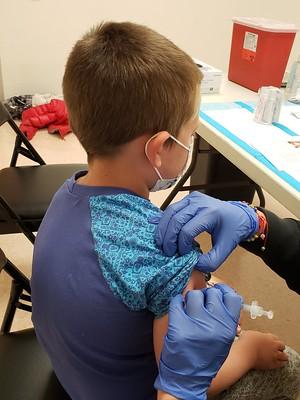A dose of bivalent (two-strain) mRNA COVID-19 vaccine booster pushed effectiveness against emergency or urgent care (ED/UC) to 80% among preschool children, compared with 46% after two Moderna monovalent (single-strain) doses and 70% after three monovalent Pfizer/BioNTech doses.
A US Centers for Disease Control and Prevention (CDC)-led research team published these study findings today in Morbidity and Mortality Weekly Report. Researchers at six sites in eight states examined the relative vaccine effectiveness (VE) of the monovalent and bivalent COVID-19 vaccines against ED/UC visits within the VISION Network from July 4, 2022, to June 17, 2023, in children aged 6 months to 5 years with a COVID-like illness tested for SARS-CoV-2.
Bivalent vaccine contains wild-type, Omicron strains
The Food and Drug Administration (FDA) approved the monovalent COVID-19 vaccine for children aged 6 months to 4 years (Pfizer-BioNTech) and 6 months to 5 years (Moderna) on June 19, 2022. On December 9, 2022, the CDC approved the use of bivalent vaccines in children 6 months and older. The bivalent vaccine was designed to protect against both the wild-type strain and the SARS-CoV-2 Omicron variant.
"Because efficacy data were limited, postauthorization vaccine effectiveness (VE) data are necessary to understand how well the vaccines work and to help guide development of future vaccine policy for this age group," the study authors wrote.
Of the 90,905 ED/UC visits in children eligible for inclusion in the Moderna monovalent analysis, 5.4% were case-patients, and 94.6% were control patients. Another 96 visits occurred among control recipients of at least one Moderna bivalent dose.
Of the 81,077 ED/UC visits in children eligible for inclusion in the Pfizer monovalent analysis, 5.7% were case-patients, and 94.3% were controls. Another 222 visits occurred among recipients of at least one Pfizer bivalent dose, 219 of whom were controls and three of whom were case-patients.
Booster uptake low
Of 5,131 case-patients identified from July 4, 2022, to June 17, 2023, 6.6% had received one or more monovalent COVID-19 vaccine doses, and 0.06% had received at least one bivalent dose. Of 92,777 controls identified during this period, 12.1% had received at least one monovalent dose, and 0.4% had been given one or more bivalent doses.
VE of two Moderna monovalent COVID-19 doses against ED/UC visits was 46% after a median of 38 days. VE of three doses of the Pfizer monovalent vaccine was 70% after a median of 35 days.
Compared with completion of a monovalent or bivalent primary vaccine series and no vaccination, the VE of at least one bivalent dose of vaccine from either manufacturer at a median of 58 days was 80% (95% confidence interval [CI], 42% to 96%).
Approximately 10% of children aged 2–4 years had received ≥1 COVID-19 vaccine dose and only 6.1% had completed the primary series as of May 2023, nearly a full year after vaccines were recommended for this age group,
The researchers noted that the median interval since receipt of the most recent dose in children who had not completed a primary series was longer than recommended dosing intervals: a median of 64 days since the first Moderna dose compared with the 4 to 8 weeks recommended between Moderna doses and a median of 58 days since receiving Pfizer dose one, versus 3 to 8 weeks recommended between the first and second doses.
"This aligns with available national data showing that approximately 10% of children aged 2–4 years had received ≥1 COVID-19 vaccine dose and only 6.1% had completed the primary series as of May 2023, nearly a full year after vaccines were recommended for this age group," they wrote.
In conclusion, the authors said that a complete Moderna or Pfizer vaccine series protected children against ED/UC visits in preschool children. "Although bivalent vaccination coverage was low in this group, ≥1 dose of bivalent vaccine also helped provide protection," they wrote. "All children should stay up to date with recommended COVID-19 vaccines, including initiation of COVID-19 vaccination immediately when they are eligible."

















